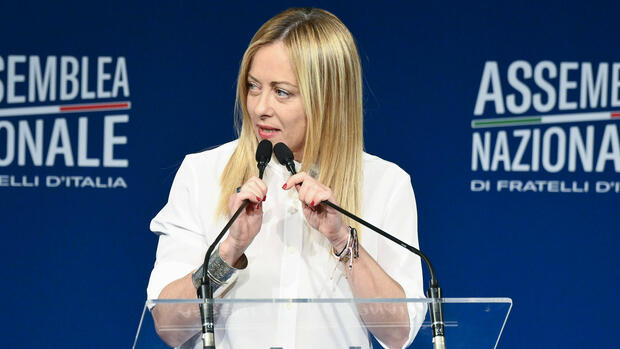Brussels, Rome After the rush of electoral success, coming face to face with the reality of governing is an unpleasant experience for many politicians. Italian Prime Minister Giorgia Meloni’s displeasure is increasingly evident these days.
During the election campaign a year ago, the right-wing populist promised to curb the number of refugees. She held out the prospect of a “naval blockade” if she were elected to the office of Prime Minister.
A simple slogan that is now taking revenge: Even as head of the Italian government, Meloni has little influence on how many people in North Africa make the dangerous journey across the Mediterranean.
The number of refugees arriving in Italy has risen sharply: while there were around 105,000 people in 2022, according to the Italian Ministry of the Interior, by mid-September this year there were already almost 124,000.
“You have to block the departures of the ships,” emphasized Meloni on Sunday in Lampedusa, where she visited a refugee camp and the port together with EU Commission chief Ursula von der Leyen – a quick program that lasted just one and a half hours. Meloni called for an “efficient European maritime mission” to deal with the crisis and help African states block illegal migration flows. Von der Leyen promised to strengthen the border protection agency Frontex. But we’ve heard that a lot in recent years.
Meloni is under pressure
Meloni is under pressure. She urgently needs success with the right-wing base, which elected her to the Palazzo Chigi last fall. As Prime Minister, the 46-year-old has so far been conspicuously pro-European, pro-Ukrainian and pro-American.
EU Commission chief Ursula von der Leyen seems ready to form a tandem with Meloni on migration policy.
(Photo: AP)
The fear that Italy would become a partner non grata under her leadership has not come true. Meloni has quickly established itself within the circles of the G7, G20 and the EU. In terms of foreign and financial policy, she continued the legacy of her predecessor Mario Draghi. She quickly cashed in on expensive election promises made by her coalition partners Lega and Forza Italia, such as a flat tax on income or a pension increase.
Meloni’s government is currently working on its first budget for next year. The scope is tight; so far there is said to be a deficit of 30 billion euros in the draft. The country’s economy shrank by a surprising 0.3 percent in the second quarter of this year, but is still expected to grow by one percent for the year as a whole. An increase of 1.1 percent is forecast for 2024.
Due to the moderate course and the uncertain economic situation, the pressure on Meloni is growing at home, including in his own cabinet: Matteo Salvini, head of the right-wing Lega and infrastructure minister, campaigned for the European election together with France’s right-wing EU opponent Marine Le Pen at the weekend. Man must use “every means” against the “invasion,” he explained at the meeting in Pontida in northern Italy.
A day earlier, Le Pen appeared in her homeland, saying she was “astonished by those who call for the European Union and at the same time claim to be patriots” – a clear attack on Meloni’s visit to Lampedusa, without the head of government and her Fratelli party d’Italia” by name.
>> Read here: Red Cross warns of humanitarian emergency in Lampedusa
Meloni cannot expect any help from the opposition. The government is acting as if the sea could be sealed, criticized opposition leader Elly Schlein on Monday in “La Repubblica”. “It makes itself vulnerable to blackmail by non-democratic regimes,” thereby violating human rights – but not stopping migration flows.
Meloni and von der Leyen
To this end, EU Commission chief Ursula von der Leyen appears to be willing to form a tandem with Meloni on migration policy. This was already evident in June when von der Leyen, Meloni and Dutch Prime Minister Mark Rutte concluded a migration deal with Tunisia.
During her visit to Lampedusa, the CDU politician highlighted the excellent cooperation with Italy and added in Italian that “Italy can count on the European Union”.
It was not expected that Leyen and Meloni would find a connection with each other. Shortly before Meloni’s election victory, von der Leyen pointed to Hungary and Poland and emphasized that the EU had instruments to deal with difficult partners.
>> Read here: The EU must shrink itself to health – a comment
That was a year ago, but politically forgotten. There is great relief in the Commission that Meloni is keeping her country on a pro-European line. At the same time, von der Leyen is exploring her chances for a second term in office. Meloni and her Fratelli d’Italia could still be useful – if they survive the migration crisis.
More: Right-wing parties could make significant gains in the European elections – the Greens are on the verge of crashing
